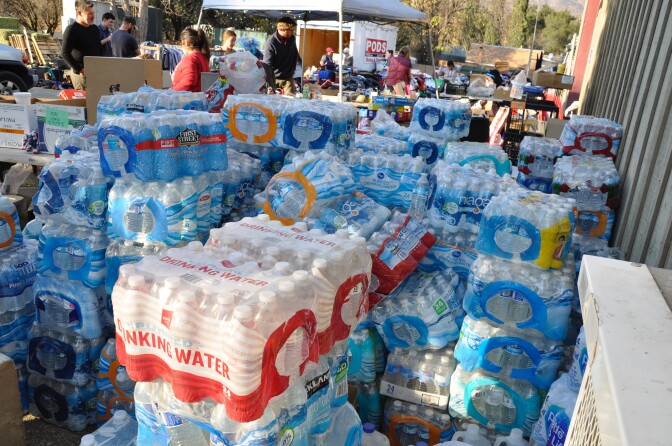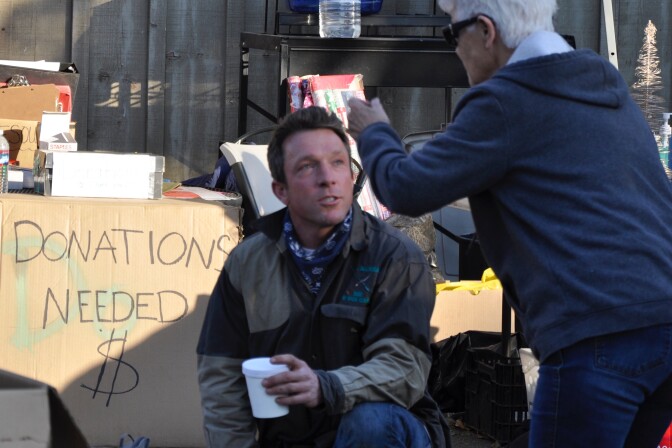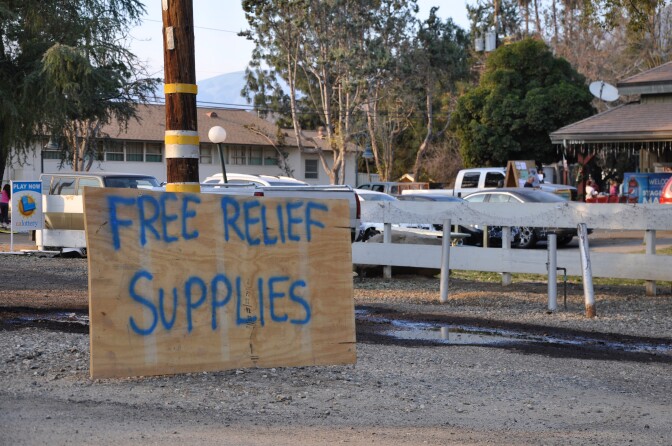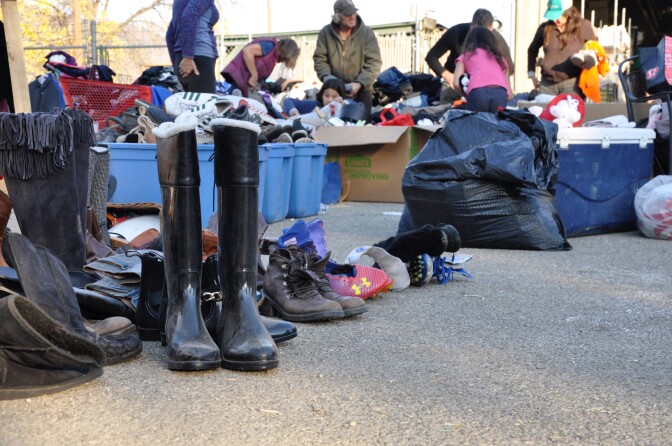This story is free to read because readers choose to support LAist. If you find value in independent local reporting, make a donation to power our newsroom today.
This archival content was originally written for and published on KPCC.org. Keep in mind that links and images may no longer work — and references may be outdated.
After the Thomas Fire, neighbors started donating to this Ojai store. They haven't stopped
In the parking lot of Stagecoach Station, a corner store on a leafy, rural road east of Ojai, Amanda Rogers spots someone she knows — someone else with a Thomas Fire story.
"It's good to see you," Rogers says, offering a hug. "You guys all right?" "Yeah," the acquaintance responds. "It's nice to see you."
Amanda and her husband Dustin Rogers lost almost everything when the wildfire ripped through the hills around Ojai and engulfed the house they were renting on Creek Road, southwest of town. The Rogers and their two kids each left home with four changes of clothes.
Here at Stagecoach Station, the Rogers have begun to rebuild. The convenience store parking lot has become a bustling, ad-hoc relief center for Thomas Fire victims.
On a recent afternoon, two dozen people sift through bin after bin of clothing, food, tools, kitchen appliances, dishes; there's an almost shoulder-high mound of bottled water. Dustin is here to pick up a donated chainsaw.
This isn't a government operation, or even an arm of a venerable relief organization like the Red Cross. Residents of this semi-isolated end of the Valley, known as "Upper Ojai," pulled it all together themselves.
And perhaps because of that, you're just as likely to find neighbors outside Stagecoach Station sitting around with cups of hot coffee, donated doughnuts or homemade soup. They've been trading stories, organizing volunteers to clear downed trees, making housing arrangements, connecting each other with contractors — and leaning on each other.
"We need community," says Amanda Rogers, who's received a lot of help from her church, as well as from this parking lot. "You need your neighbors, your friends, your family. People are bringing us meals, but they don’t just drop it off. They stay with us so we can tell our story and heal."
The relief effort still has a yard-sale feel, but within the last week, it's become much more formalized. The neighbors have created a non-profit organization, "Upper Ojai Relief." They started a website and have obtained a federal tax number in hopes of eventually being able to receive tax-deductible donations.

The whole effort started almost by accident.
When officials placed Upper Ojai under mandatory evacuation orders, many residents stayed behind to defend their properties — more residents than officials had anticipated, said Jason Hodge, a Ventura County firefighter and Thomas Fire incident spokesman. Because of this underestimate, the government-directed fire aid stations were sent to Ojai proper — 8 miles away — or to Ventura.
Meanwhile, after several high-stress days defending their homes behind the evacuation roadblocks, neighbors Trevor Quirk and Justin Homze decided to organize a pancake breakfast for all the Upper Ojai residents who had stayed behind.
On Facebook, another friend of Quirk's saw the invite to the breakfast he posted and offered to donate more than 100 burritos — but because she lived in Ventura, she couldn't get past the mandatory evacuation roadblocks. Quirk offered to meet her at the barricade to pick up the food.

"By the time I get to those roadblocks to pick up those burritos," Quirk says, "there are five other cars there who are donating stuff."
Quirk says there was still leftover food and supplies after the breakfast, so he asked the owner of Stagecoach Station whether he could leave the donated goods in a back area of the market. From there, word spread through social media.
"Let me show you how this works," says Quirk, whipping out his cell phone. He snaps a photo of Dustin and Amanda Rogers, who are back at Stagecoach Station not only for a chainsaw, but to offer to help other victims.
"I’m taking a picture of them," Quirk explains, "and then I’m thanking them on Facebook, right? And then their family sees it. And it catches on faster than the wildfire, man. That’s how it happens."
"You know what? It gets the job done, fast."

On the night the Thomas Fire was creeping up Sulphur Mountain, Quirk cut a fire line around his own property with his tractor. His own home is still standing, though a neighbor's home went up in flames that night.
But as harrowing as this time has been, Quirk — a jovial, energetic personal injury attorney — also clearly finds relief work exhilarating. His social media feeds have become hubs for those seeking donated goods or those seeking to make donations.
At one point, Quirk recalls, "we needed plastic bins. I went over, took a picture of plastic bins. I said, ‘Hey, Upper Ojai, plastic bins needed at the Station.’ Five minutes later, a lady parks right underneath that pine tree, she gets out and she says, ‘Is there a Trevor here who needs plastic bins?’"
Ben Rhynsburger, whose house is all right, says he came to the Stagecoach Market to help out however he could — building racks for the donated clothes, collecting canned goods, leaving his trailer for collecting discarded cardboard.
"When you lose everything, it’s unending — you need everything," Rhynsburger says.

Peter Stuart Swart lost everything in the Thomas Fire, including his home and a vintage car. He says he was able to pick up tools, shovels, wheelbarrows and a shop-vac at Stagecoach Station. But he also found community.
"This has become the place to hang out," says Swart. "It’s nice to take your mind off— if you lose everything and you face it, you can take your mind off it."
Upper Ojai Relief's work is far from over. Ventura County Fire's Jason Hodge says early estimates are that Upper Ojai lost roughly 10 percent of its housing stock in the Thomas Fire.
"It’s the ultimate in community self-help," says Hodge. "To have them doing this kind of help for each other, it's a beautiful thing."












